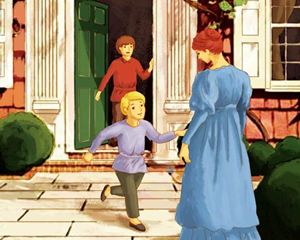At four o'clock we lunched on bread and goat's-milk cheese, as we sat on the sofa; and when we rose, I do not know why, but my father did not wish me to brush off the back, which the little mason had spotted with white, from his jacket: he restrained my hand, and then rubbed it off himself on the sly. While we were playing, the little mason lost a button from his hunting-jacket, and my mother sewed it on, and he grew quite red, and began to watch her sew, in perfect amazement and confusion, holding his breath the while. Then we gave him some albums of caricatures to look at, and he, without being aware of it himself, imitated the grimaces of the faces there so well, that even my father laughed. He was so much pleased when he went away that he forgot to put on his tattered cap; and when we reached the landing, he made a hare's face at me once more in sign of his gratitude. His name is Antonio Rabucco, and he is eight years and eight months old.
到了四時(shí),我們坐在安樂(lè)椅上,吃牛油面包。等大家離開(kāi)了椅子,我看見(jiàn)“小石匠”上衣上粘著的白粉沾在椅背上了,就想用手去抗。不知為什么,父親忽然抑住我的手。過(guò)了一會(huì)兒,父親自己偷偷地拭凈了。我們?cè)谟螒蛑校靶∈场鄙弦碌募~扣忽然落下了一個(gè),我母親替他縫綴。“小石匠”紅了臉在旁看著。我將滑稽畫(huà)冊(cè)給他看。他不覺(jué)一一裝出畫(huà)上的面式來(lái),引得父親也大笑了。回去的時(shí)候,他非常高興,以至于忘記了戴他的破帽。我送他出門,他又裝了一次兔臉給我看,當(dāng)做答禮。他名叫安東尼阿·拉勃柯,年紀(jì)是八歲零八個(gè)月。

Do you know, my son, why I did not wish you to wipe off the sofa? Because to wipe it while your companion was looking on would have been almost the same as administering a reproof to him for having soiled it. And this was not well, in the first place, because he did not do it intentionally, and in the next, because he did it with the clothes of his father, who had covered them with plaster while at work; and what is contracted while at work is not dirt; it is dust, lime, varnish, whatever you like, but it is not dirt. Labor does not engender dirt. Never say of a laborer coming from his work, "He is filthy." You should say, "He has on his garments the signs, the traces, of his toil." Remember this. And you must love the little mason, first, because he is your comrade; and next, because he is the son of a workingman.
安利柯啊!你去拭椅子的時(shí)候,我為什么阻止你,你不知道嗎?因?yàn)槿绻谂笥衙媲笆茫蔷蜔o(wú)異于罵他說(shuō):“你為什么把這弄齷齪了?”他并不是有意弄污,并且他衣服上所沾著的東西,是從他父親工作時(shí)拈來(lái)的。凡是從工作上帶來(lái)的,決不是齷齪的東西,不管他是石灰、是油漆或是塵埃,決不齷齪。勞動(dòng)不會(huì)生出齷齪來(lái),見(jiàn)了勞動(dòng)者的人,決不應(yīng)該說(shuō)“啊!齷齪啊!”應(yīng)該說(shuō)“他身上有著勞動(dòng)的痕跡。”你不要把這忘了!你應(yīng)該愛(ài)“小石匠”,一則他是你的同學(xué),二則,他是個(gè)勞動(dòng)者的兒子。
ThyFather.
——父親——












